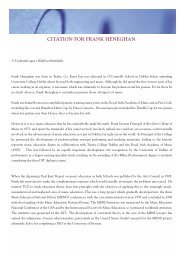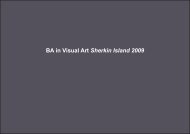TWICE THE SIZE - DIT Update - Dublin Institute of Technology
TWICE THE SIZE - DIT Update - Dublin Institute of Technology
TWICE THE SIZE - DIT Update - Dublin Institute of Technology
You also want an ePaper? Increase the reach of your titles
YUMPU automatically turns print PDFs into web optimized ePapers that Google loves.
SCENARIO 3: Noe’s Children (National scenario: <strong>THE</strong> FRAGILITY OF MÉ FÉIN)<br />
John Doyle’s oriental passenger settled back comfortably in his seat, placing his <strong>of</strong>fcom<br />
(electronic <strong>of</strong>fice and communications unit) and suitcase on the seat beside him as the ro<strong>of</strong><br />
dome closed and the elegant water-taxi eased away from the pier. Applying power to the semi<br />
solar motor, John took a glance around, and after an additional check <strong>of</strong> the TP (Traffic<br />
Proximity) screen let the craft move gracefully out into the open waters <strong>of</strong> Cork Harbour. The<br />
surface <strong>of</strong> Lough Mahon ahead gleamed goldly in the early morning sun as he navigated past<br />
Blackrock Island, where he had lived before the floods, when it was part <strong>of</strong> the mainland and a<br />
prosperous Eastern suburb <strong>of</strong> Cork City. He could never pass this point <strong>of</strong> his route without<br />
being saddened at the thought <strong>of</strong> the old hospital and all the houses <strong>of</strong> Beaumont and Ballinure<br />
that were concealed beneath the beauty <strong>of</strong> the waters lapping the island bund.<br />
The second decade <strong>of</strong> the 21 st century had been a black period in Ireland’s history, made all the<br />
worse in Cork by a series <strong>of</strong> horrendous winters during which the might <strong>of</strong> the Atlantic ocean<br />
had asserted itself, inexorably eating up the lowland shores <strong>of</strong> the Harbour, inundating first the<br />
shore-line roads, and then street by street, the houses proudly built by a prosperous populace.<br />
The oil crisis only added to the misery <strong>of</strong> the thousands evicted by the waves. There had been<br />
little preparedness: the governing political parties dithered, unwilling to dictate the radical<br />
measures that would have been necessary to at least lessen the impact <strong>of</strong> the rising waters. For<br />
a couple <strong>of</strong> years before Cork began to feel the effect <strong>of</strong> global warming many other places in<br />
Europe had already suffered such inundations, but government metaphorically kept its head in<br />
the sand until it was too late.<br />
In Cork three or four children to a bed, and two or three families to a house, which had been a<br />
characteristic <strong>of</strong> the Ireland <strong>of</strong> a hundred years before, became the norm again, as did high<br />
unemployment, as large industrial concerns were reduced to a series <strong>of</strong> cottage industries.<br />
159<br />
As the climate deteriorated,<br />
and low-lying lands all over<br />
Ireland were swamped, the<br />
authorities lost control, as<br />
homelessness on a wide<br />
scale, and widespread<br />
public alarm, soon led to a<br />
dark age <strong>of</strong> riots and<br />
lawlessness. The gradual<br />
disappearance <strong>of</strong><br />
economically priced oil led<br />
to chaos in terms <strong>of</strong> heating<br />
and lighting.








